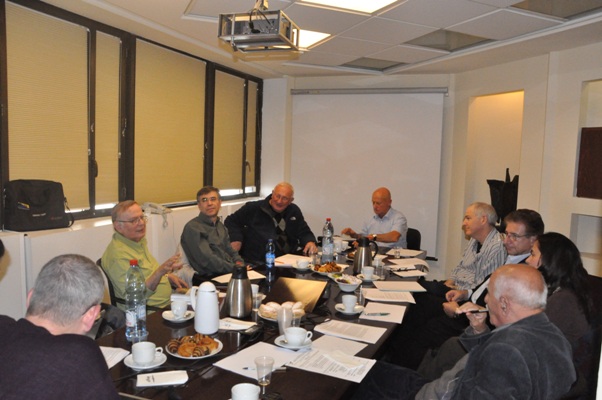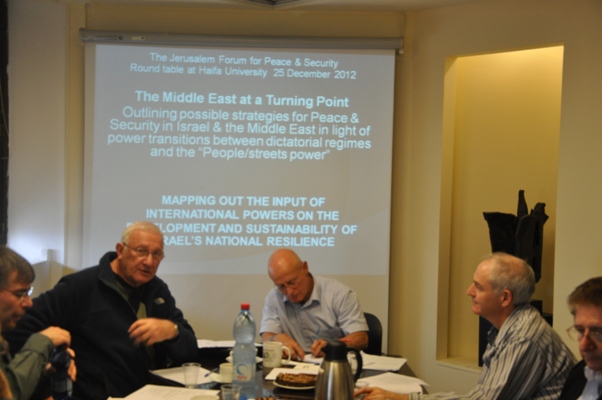![]()
The Words of the Ben-Zvi Family
|
|
The Words of the Ben-Zvi Family |

Haifa, Israel -- The third meeting of the Jerusalem Peace and Security Forum 2012 took place at Haifa University on December 25. The gracious host was Admiral (ret.) Ami Ayalon, Chairman of the Executive Committee at Haifa University. Following his warm welcoming remarks, all forum participants introduced themselves briefly.
Professor Eliezer Glaubach, a historian and a political writer, moderated the forum. He asked Mr. Hod Ben Zvi -- senior advisor of UPF-Israel, to present the topics set for discussion. Mr. Ben Zvi suggested exploring "The Input that the International Powers have on the Development and Sustainability of Israel's National Resilience." He also suggested the issue of complying with the power shift in the Middle East from dictatorial regimes to newly emerging democracies.
"It seems that we all passively recognize the changes in our region," said Mr. Ben Zvi. "However we must respond by developing new national strategies, enabling us to deal with the outcome of the rising of street power in our neighboring countries."
Professor Glaubach started off the discussion by offering an extensive review regarding the transformations taking place in in the Middle East. Touching upon the threats Israel is facing on both the southern and the northern borders, he then focused on Syria, Gaza, and Egypt. "Israel has developed some strategies for dealing with the conflict in our area that can be implemented in other conflict areas around the world," said Prof. Glaubach. "Israel's steadfastness in coping with surrounding opposing nations is attributed, among other factors, to the willingness of its young soldiers to give their best to defend their country."
Professor Benjamin Miller, the Head of the International MA Program in Peace and Conflict Management at the University of Haifa, pointed out three measurements of the changes in our area:
1.Democratization, the implications of moving away from authoritarian regimes towards the power of civil society.
2.The rise of a variety of Islamic identities that were previously oppressed in the Arab nations.
3.The failed state model in the Arab countries, leading to revolutions, civil wars and the collapse of social order.
"The dependency on foreign financial support keeps the US as a main player in the Middle East; however, its hegemony is constantly challenged by Russia and China," said Prof. Miller and noticed that while the Obama -- Clinton rhetoric is in support of the opposition, strategically the US is in a stalemate.

Dr. Eldad Pardo, a senior researcher at the Truman Institute of Hebrew University and a specialist on Iran and Middle East studies, brought up an innovative approach. "Positioning Israel as a democratic Jewish state will send a clear signal around the Middle East that we are only interested in defending ourselves. Being detached from the Sunni/Shiite conflict is a proof of our non-expansionist intentions."
Dr. Pardo reviewed some of the of the positioning models in the region: Israel is a Jewish democratic society state with a Western message; Turkey, Saudi Arabia, and Qatar are countries where a minority rules the majority; Saudi Arabia is the guardian of Islamic holy places and Arabism; and Qatar is where a lot of money was used well to create a good position and news media in order to change regimes and become a mediator.
He then suggested drawing valuable lessons from Martin Luther King, Jr.'s approach, by focusing on attaining universal values rather than fighting for Afro-American rights, thus widening the range of society's support. Another lesson could be drawn from Antonio Gramsci's thought: developing a hegemonic culture which propagates its own values and norms that then become the 'common sense' values of all. "We should tell a nice story to create a good model that all people can accept."
Col. (ret.) Moshe Zurich, of the IDF Intelligence Corps, stressed the need to realize that we are observing changes that are still in processes. At such time with so many variables, it is not easy to give a definite analysis.
For example, Egypt and Syria don't know yet where are they heading. Lebanon and Jordan will be influenced sooner or later. Iran as well would not be able to avoid the effects and will be influenced by the local players and by what is going on in this region.
Col. Zurich said "Israel is unclear on the issues of the Palestinians, the West Bank, Hamas, and Hezbollah in Lebanon, so we should take into account that Syria's political situation after the revolution might become Israel's biggest threat." Israel's view on things should be from the inside out, while producing a clear self-definition and only then relating to the response of other nations.
Admiral Ami Ayalon's main concern was regarding the need to fight terror on one hand while keeping a democratic and an ethical attitude on the other. Adm. Ayalon measures democracy not as a system of majority power but rather as "a system where human and minority rights are protected."
Adm. Ayalon made the following observation: "I had reached the conclusion that a person's honor is a value that is more important than human life." He then gave as an example the right of a dignified death, which explains the willingness of people to sacrifice their life on the battle field.
Another comment he made was regarding our fate: "Everything is predetermined, but there is a freedom of choice; we are like a boat floating on a stormy sea, so the steering command will determine which direction the boat will sail, and whether we will survive the storm."
Essentially, Israelis and Palestinians can live side by side; however, how can we get there when there is such mutual hate and distrust? We must change the paradigm of direct negotiations. It has failed time and again, and demanding it just wastes time. We have to move into a new phase of constructive unilateral moves by both sides as long as they bring us closer to the goal of peaceful settlement, and ask the international community to support such steps.
Mr. Jeremy Jordan, Secretary General of UPF-Israel, presented the case study of Hong Kong. He explained the development process from a primitive economic system into its current highly developed situation. He said, "We have here a model way of dealing with refugees and economic weakness. It is amazing to see how in its developing process, Hong Kong took an opportunity and dealt with refugees in a way that brought an economical advantage."
Sheik Ali Birani, an expert in Middle Eastern studies, pointed out that the western world in general and Israel in particular do not properly understand the Islamic faith, its religious laws, rulings, and manners. Over-simplistic views of the "old-fashioned" Arab world might lead to insufficient assessment and to outdated strategies.
The lively discussion continued over lunch, planting the seeds for the next forum meeting in February 2013